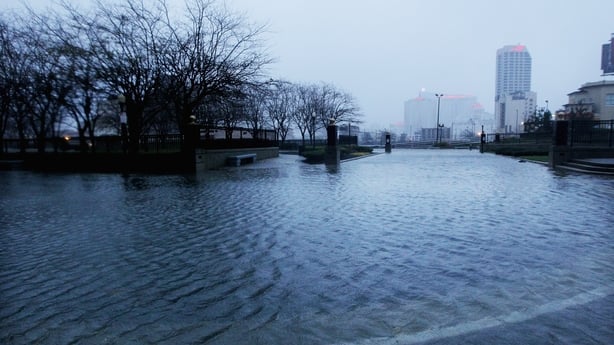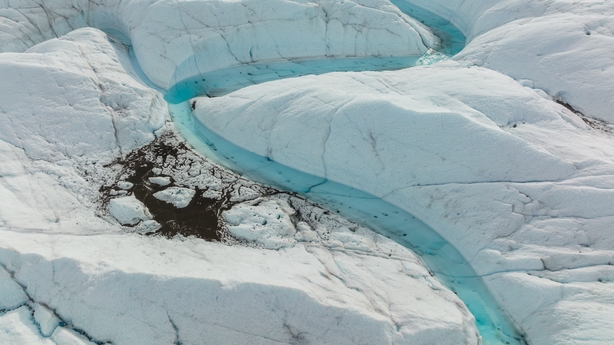Global temperatures rose 1.1C above the pre-industrial average according to a World Meteorological Organization report on the decade of climate change from 2011-2020 - driving the prevalence of food insecurity, contributing to mass migration and impairing health.
The WMO report found the ten years up to 2020 were the hottest decade on record with sea levels rising and glaciers melting at unprecedented rates.
It also includes details on the the serious impacts on human populations at a cost of billions of dollars in loss and damage.
The report outlines the consequences of the increased heat and they include extreme weather events which "had devastating impacts, particularly on food security and human mobility".
It says that floods displaced 123 million people and storms 86 million in the decade 2011-2020.
Drought in Somalia in 2011-2012 led to a famine which killed 258,000 people including 133,000 children under the age of five.
The drought exacerbated a pre-existing water shortage and led to "a devastating and repeated loss of lives, livestock and crops".
In Columbia "a record breaking mega-drought" from 2015-2016 had a major impact on electricity supply because at that time more than 70 percent of power came from hydro-electric plants.
The WMO says tropical cyclones are still ranked among the most significant natural hazards and account for a large share of the high impact events in terms of casualties and economic losses during the decade 2011-2020.
It says both the North Atlantic and North East Pacific basins had above average activity with 2020 setting a new record of 30 named storms in 2020.
The southern hemisphere saw below average tropical cyclone activity. It says that no study has "any climate change signal risk of occurrence or intensity of any given tropical cyclone" but climate change has caused heavier rainfall in Hurricane Harvey (2017) and Hurricane Dorian (2019) in the North Atlantic.
Studies have also found that climate change contributed to the risk of coastal flooding from storm surges as happened during Hurricane Sandy on the North-East coast of the United States in 2012.

It also found that extreme heat events were well above the previous average and "virtually every attribution study carried out on an extreme heat event in 2011-2020 found that the risk of the event increased significantly because of anthropogenic climate change".
In a small number of cases, it was found that the event would have been virtually impossible in
"the absence of anthropogenic climate change."
The WMO says: "There are, so far, few events where it can be said that anthropogenic climate change 'caused' the event in the sense that it would have been impossible in a pre-industrial climate."
However it does add that the science of attribution or linking to extreme events to climate change has "developed greatly" and "for many extreme events, the risk of an event of that magnitude has been altered, often greatly, because of anthropogenic climate change".
The report says "It is becoming increasingly clear that climate extremes are affecting the ability of populations to develop sustainably".
It says individual countries are being inhibited in their efforts to reach sustainable development goals such as lifting people out of poverty, switching to clean energy and ending hunger.
"Unless we act now, the 2030 Agenda could become an epitaph for a world that might have been," the report said.
Zero Hunger by 2030 is a key UN goal but the report says progress made after the turn of this century stalled and then reversed during the decade 2011-2020.
It says managing climate risk is "tightly linked" to ending hunger and "For example, heat-stress conditions could result in food losses at the production stage and weather-related hazards such as landslides caused by heavy rains may affect road infrastructure, hindering transportation and access to markets, which then results in food spoilage and waste".
It also says that "Humans are becoming more susceptible to infectious disease as the suitability of dengue and malaria transmission is increasing with changes to the global climate", as the transmission season for malaria lengthened in the highlands of both the Americas and Africa.
There is some good news in that improved early warning systems have reduced the number of casualties from extreme events, but report says the only way to prevent further more serious impacts on human populations is to reduce Greenhouse Gas (GHG) emissions.
The WMO Secretary General, Petteri Taalas, writes in his introduction "emissions must be drastically and sustainably lowered".
The WMO promises to help this process by preparing a new scheme for monitoring the sinks and sources of the main GHG's.

Glaciers melting at unprecedented rates, says WMO
The WMO report said there is an urgent need to cut greenhouse gas emissions.
It shows that the six years from 2015 and 2020 were the six hottest years on record up to this year and they finished off the hottest decade on record.
That extra heat saw the Greenland ice sheet shrink 50% faster and the Antarctic Ice sheet lose nearly 75% more ice than they had in the previous decade.
Ocean heating also accelerated and seas are now rising almost twice as fast as they were a generation ago.
Those grim records set in the ten years up to 2020 look set to be broken as this year 2023 is expected to be the hottest recorded.
That trend has prompted the WMO to warn that more extreme weather is already having "a clear and demonstrable impact on socio-economic development" adding that greenhouse gas emissions must be cut to prevent climate change spiralling out of control.








